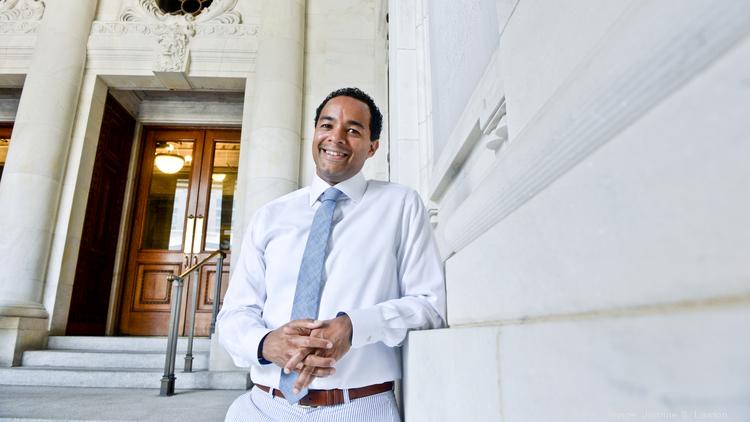As D.C.-based 1776 works to finalize its merger with Philadelphia co-working company Benjamin’s Desk, one question has emerged: Will the for-profit D.C. incubator end up owing the District $40,000, as per a 2013 grant agreement with the city?
The District gave $200,000 to 1776 in early 2013 to help with its creation and incubator buildout in D.C. Part of that grant agreement — which expires at the end of 2017 — includes a “nonassignability” clause that prevents 1776 from transferring that grant benefit to another entity unless D.C. agrees in writing, according to a copy obtained by the Washington Business Journal.
That clause also covers “any assignment caused by a change in the corporate structure of the grantee,” which the pending deal with Benjamin’s Desk, as sources have described to us, may trigger. In another section of the agreement, abrogating the terms means 1776 must return a prorated portion of the grant money, amounting to $40,000 in the last year.
If the deal closes, which could be as early as this week, investors from both 1776 and Benjamin's Desk would pour additional money into the combined co-working company, and Benjamin's Desk would keep and use the 1776 brand. Meanwhile, 1776 co-founder and CEO Evan Burfield would spin off a software company based on the D.C. incubator's startup collaboration program, Union, which would receive separate funding under the planned deal.
Brian Kenner, D.C. deputy mayor for planning and economic development, said the District will review the agreement to determine if 1776 owes the city any money, but said it's difficult to say yes or no until the city has all the details. 1776 has not yet asked permission to transfer the grant incentive, he noted, and any action would have to go through a legal review.
“1776 has been keeping the city updated a little bit on developments,” Kenner said. “They haven’t come to ask for anything formal because nothing is finalized from their perspective.”
But Kenner said 1776 has succeeded in the original aim of the grant agreement: to boost D.C.'s reputation as a startup hub. He said he is happy with the startup activity the incubator helped produce in the District, citing transportation data display firm TransitScreen as an example of an incubator tenant that moved out into its own D.C. headquarters.
The grant provided $50,000 for 1776 to use for fixtures, amenities and buildout of the original 15,000-square-foot space, and $150,000 for a line of credit. The grant agreement also spells out strict reporting requirements from 1776 to the District, including annual reports of tenant rates, operating expenses and revenue. The agreement gave the District the ability to audit much of the business and correct any deficiencies that came up.
Kenner said he could not immediately confirm whether the Office of the Deputy Mayor for Planning and Economic Development had received those documents from 1776. “I would have to consult the actual reports,” he said. But he added the point of the reports was to help ensure 1776 followed through on its end of the grant agreement, which he said it did.
Victor Hoskins, who was the District's deputy mayor for planning and development at the time, signed the deal in 2013, alongside Assistant Attorney General Patricia Allen and 1776's Burfield. Hoskins said 1776 had followed through on its reporting requirements up until he left D.C. government in June 2014



